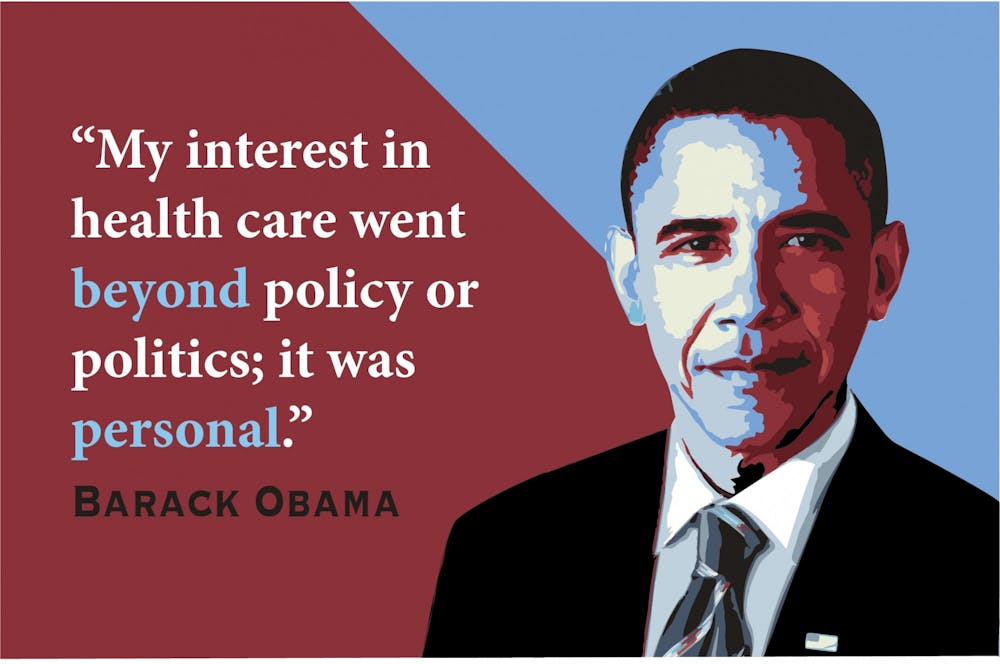In October 2020, former president Barack Obama released an adapted excerpt from his memoir “A Promised Land” in The New Yorker titled “A President Looks Back On His Toughest Fight” — which delves into one of his most enduring battles to reform the severed American healthcare system through the passage of the Affordable Care Act (ACA). Facing a divided political landscape, Obama traces his political battle towards a more unified and accessible healthcare system for Americans regardless of income, class, gender, age, or race — an issue close to his personal life. After experiencing the death of his mother, Ann Durham, to ovarian cancer partly due to insurance companies refusing to pay for certain treatment options, Obama describes his personal stake in ensuring that illness in America does not equate to depletion of financial resources and inaccessible medical treatment.
In previous speeches, both Barack and Michelle Obama ’85 have alluded to president Obama’s mother and her struggles with health insurance companies in 1995. During his appearance with Republican rival John McCain in the 2008 debate in Nashville, Obama referenced his mother’s illness by saying, “In a country as wealthy as ours, for us to have people going bankrupt because they can’t pay their medical bills — for my mother to die at the age of 53 and have to spend the last months of her life in the hospital room arguing with insurance companies because they’re saying that this may be a pre-existing condition and they don’t have to pay for her treatment, there’s something fundamentally wrong about that.”
He weaves this anecdotal experience into a discussion of the American healthcare system and its shortcomings, reminding readers of the lives that are affected by political decisions. And, much like his description of his mother’s illness, Obama’s words in this excerpt from “A Promised Land” are not linear nor predictable; they’re natural and thoughtful — deliberate, even — as he wrestles and makes amends with his presidential journey on paper. His prose is intentional and imbued with a refreshing honesty as he grapples with his goals surrounding healthcare, unpacks specific opponents’ perspectives, and understands the origin of his drive to reform healthcare in America. Obama’s voice is poised and prideful, but also humble, as he outlines the many advances he made with a Republican-dominated leadership. His approach in this excerpt is not to lay out or impose thoughts on readers, but rather to question his assumptions and intentions and how tightly woven politics was in every decision.
What I appreciate most about Obama’s narrative is his fearlessness in admitting something that many politicians routinely shy away from: the link between the personal and the political. Recalling the moment when he and Michelle had to take their daughter, Sasha (who was three months old at the time), to the emergency room for viral meningitis, he describes the helplessness and lack of control he felt as his daughter was rushed into hospital procedure rooms. Obama’s account is personal and political in the most intimate way; he discloses his vulnerabilities and the moments he felt the weakest as a father, American leader, and advocate — stressing our common humanity and what it means to feel powerless and “wounded ... no matter how modest the [healthcare] reform” was. But with this, he also shows us that the most defining moments of our lives are the bravest and most arduous.
Obama certainly faced a great deal of opposition when proposing his series of healthcare reforms, but his relentless determination and anecdotal experiences enabled him to overcome such barriers. As many of us have learned, the reformation of the American healthcare system, which has become increasingly urgent due to the COVID-19 pandemic, is no small feat. Obama recognized this, but also expressed the underlying hope he had since healthcare was “the item that most affected people’s day-to-day lives” and was thus most likely to “build momentum” on the legislative agenda.
Obama begins his narrative with a striking overview of the opposition he faced, both from his own staff and Republicans. His then-White House Chief of Staff Rahm Emanuel and then-Senior Advisor David Axelrod repeatedly warned him of the risks of passing a large-scale healthcare law like the Affordable Care Act in the aftermath of the Great Recession. The most pressing question was how to pay for the changes — who would agree to spend more on healthcare when insurance companies and Big Pharma would not. Despite debates on the Democratic side, both Emanuel and Axelrod ultimately supported President Obama as they trekked into “months of work” and recruited “a top notch health-care team to keep [them] on track.”
In the excerpt, President Obama avoids explicit criticism of those who stood in his way towards the fight for the ACA, more commonly known as Obamacare. He writes about the “Tea Party Movement” which heavily opposed his healthcare reform agenda, suggested conspiracy theories about him, and questioned his intentions as President.
Obama also recounts the moment from his 2009 healthcare speech to Congress when Republican Senator Joe Wilson of South Carolina pointed at him and shouted “You lie!” Recalling this moment, which left him and the crowd in a stunned silence, Obama writes: “I was tempted to exit my perch, make my way down the aisle, and smack the guy in the head. Instead, I simply responded by saying, ‘It’s not true,’ and then carried on with my speech as Democrats hurled boos in Wilson’s direction.”

In his memoir, President Obama brings readers into his fast-paced world of navigating a land that was — and continues to be — in dire need of health security and affordable medical care. But, in the midst of this prolonged race for affordable healthcare, Obama discloses how he learned to slow down, appreciate his own health, and remind himself of what he was fighting for. With this, he brings readers into his conversations with allies and opponents, with family and close friends — all of whom offered their fair share of guidance and surprise.
The honesty and the vulnerability underlying this narrative remind us, as students who may be entering careers that intersect with policy, that politicians bring with them a slew of personal experiences that can fuel social change. Students’ experiences and backgrounds inform, challenge, and inspire the career opportunities they pursue and how they hope to impact communities. Underlying Obama’s memoir, political agenda, and all the opposition he faced, I sensed what could ultimately be boiled down to an ode to a larger community. His fight for the ACA informs students who will be making decisions that impact others and stresses personal responsibility and selflessness: “Passing a healthcare bill wouldn’t bring my mom back. It wouldn’t douse the guilt I still felt for not having been at her side when she took her last breath. But, it would save somebody’s mom, somewhere down the line. And, that was worth fighting for.”









